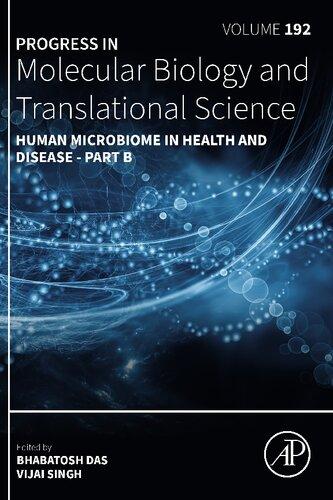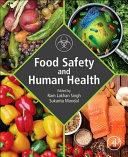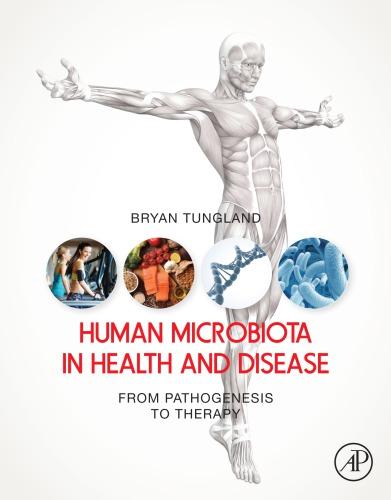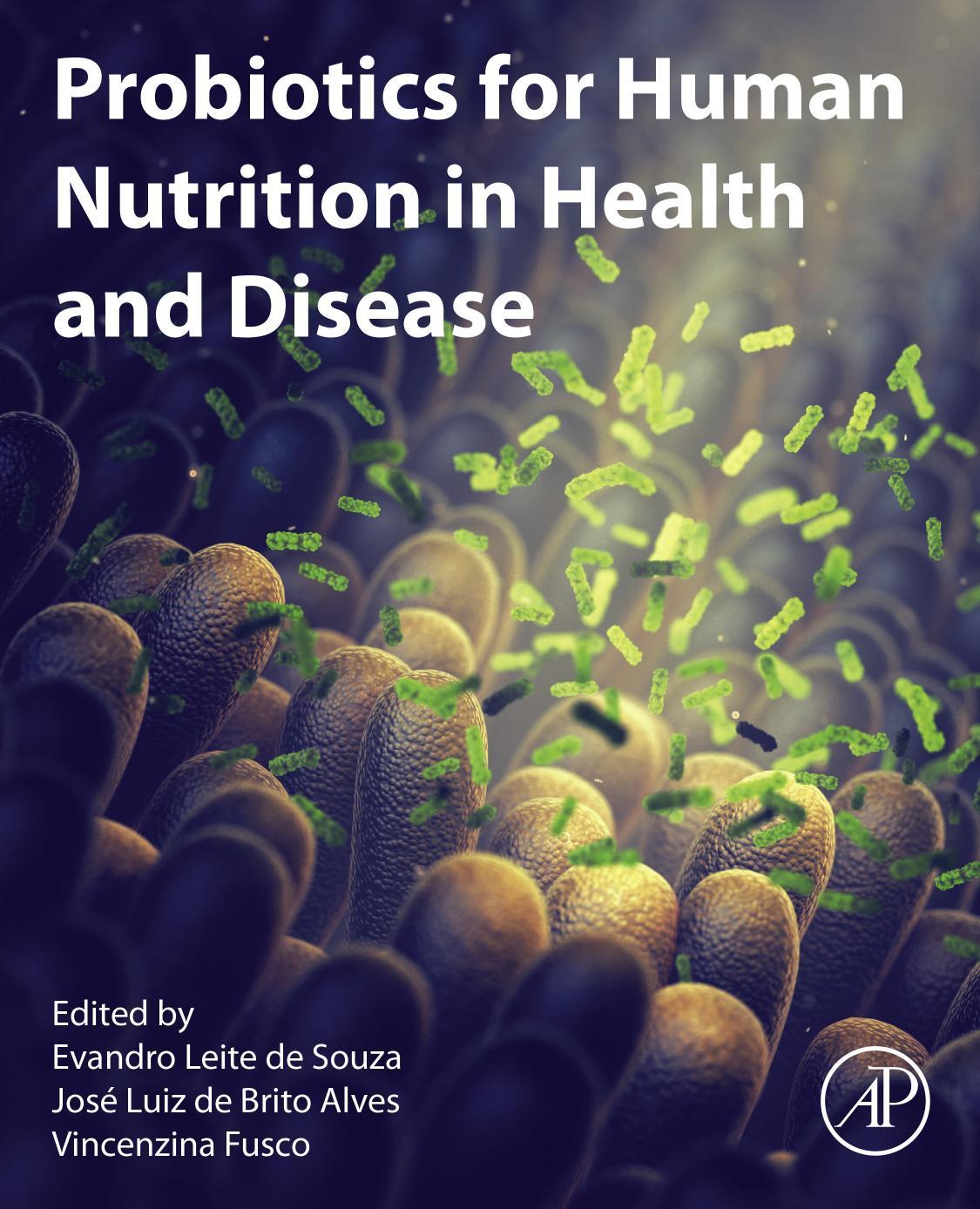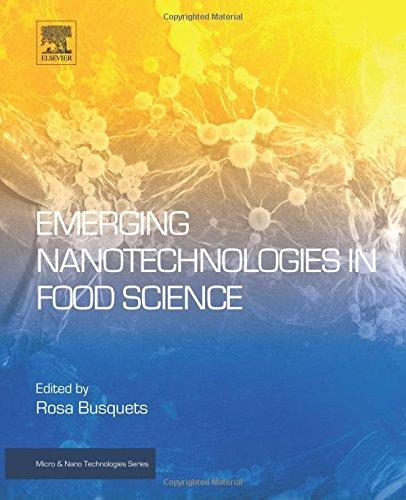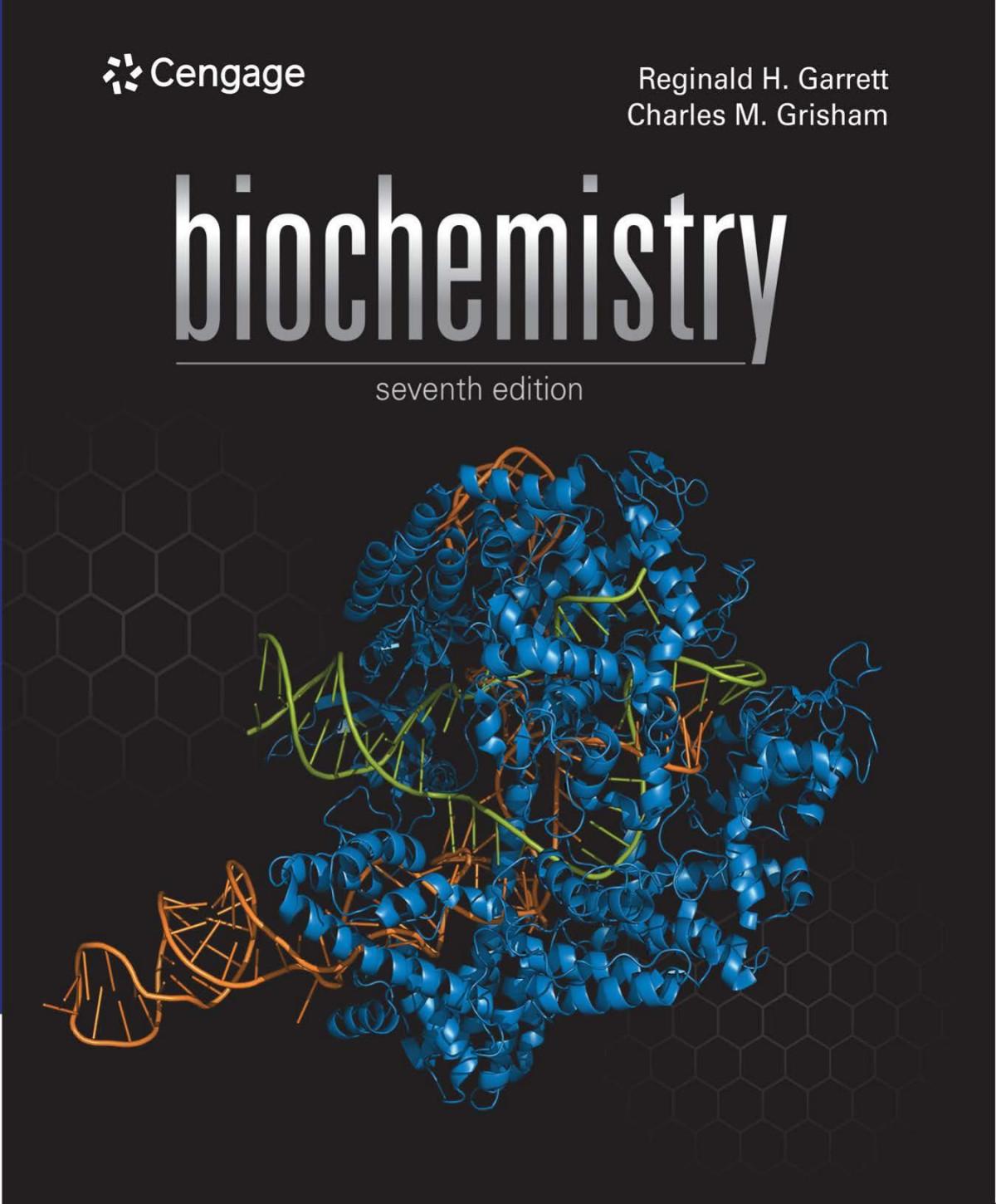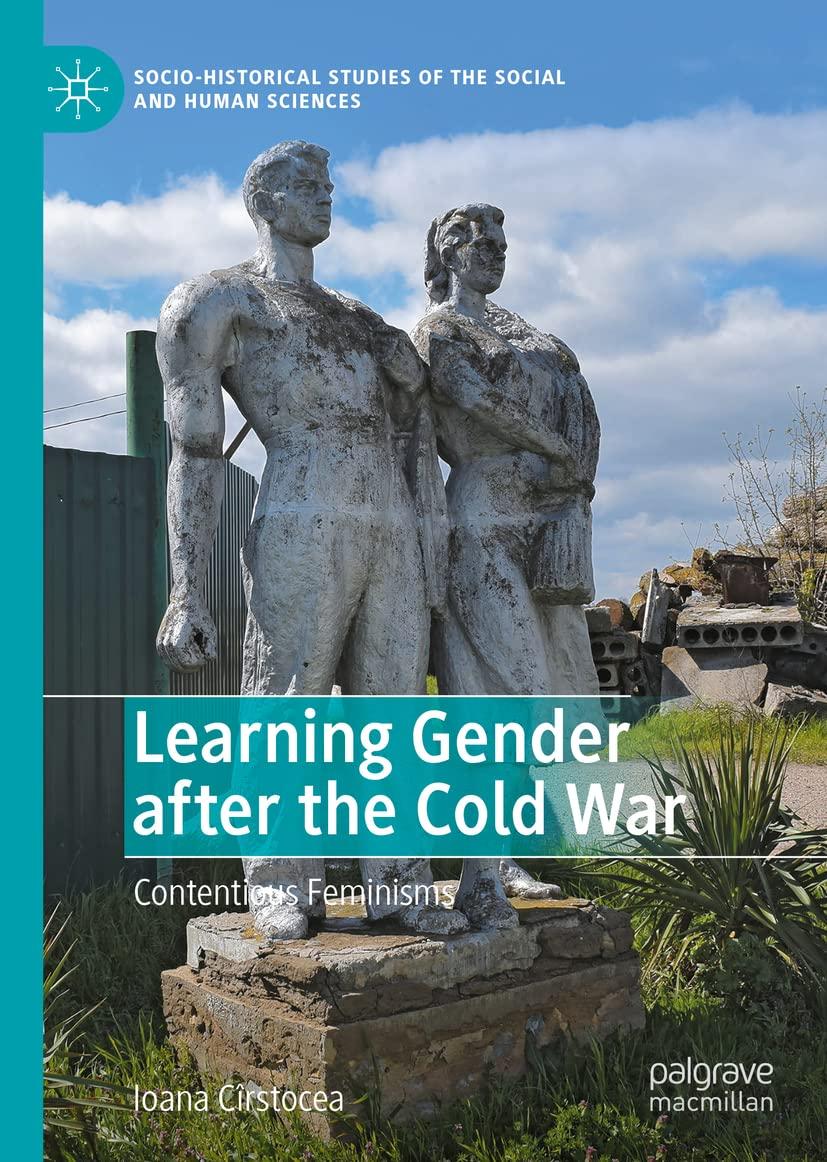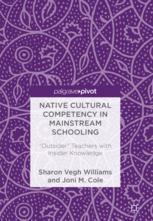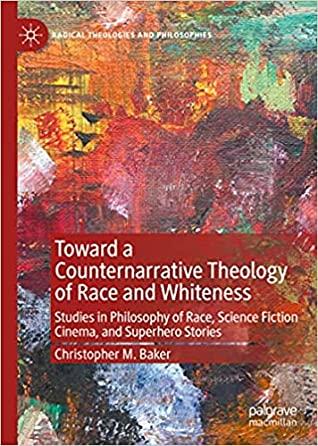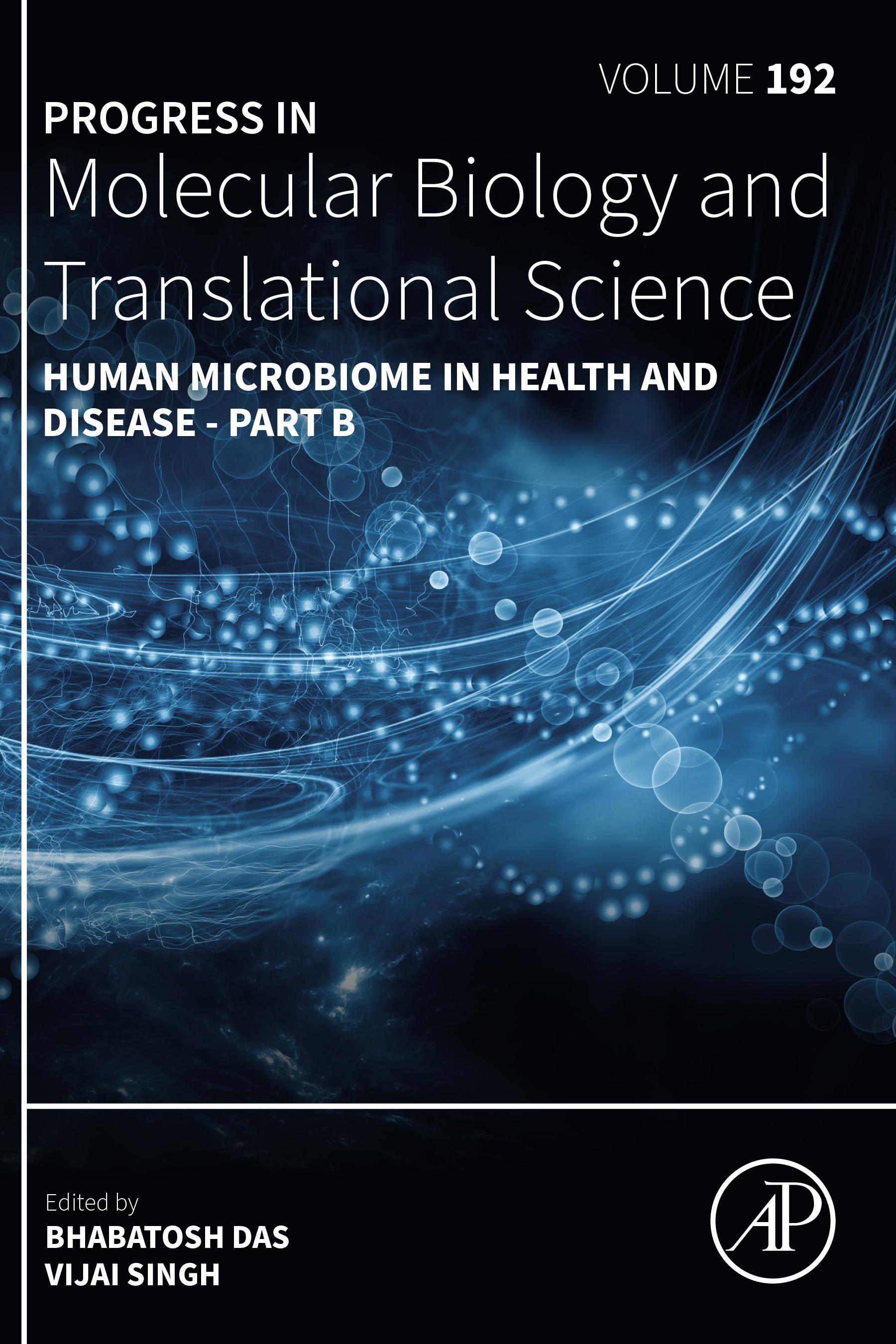PROGRESSIN MOLECULARBIOLOGY ANDTRANSLATIONAL SCIENCE
HumanMicrobiomeinHealthand Disease-PartB
Editedby
BHABATOSHDAS
MolecularGeneticsLaboratory,InfectionandImmunology Division,TranslationalHealthScienceandTechnology Institute,Faridabad,Haryana,India
VIJAISINGH
DepartmentofBiosciences,SchoolofScience, IndrashilUniversity,Rajpur,Mehsana,India
AcademicPressisanimprintofElsevier
50HampshireStreet,5thFloor,Cambridge,MA02139,UnitedStates 525BStreet,Suite1650,SanDiego,CA92101,UnitedStates TheBoulevard,LangfordLane,Kidlington,OxfordOX51GB,UnitedKingdom 125LondonWall,LondonEC2Y5AS,UnitedKingdom
Firstedition2022
Copyright©2022ElsevierInc.Allrightsreserved.
Nopartofthispublicationmaybereproducedortransmittedinanyformorbyanymeans,electronic ormechanical,includingphotocopying,recording,oranyinformationstorageandretrievalsystem, withoutpermissioninwritingfromthepublisher.Detailsonhowtoseekpermission,further informationaboutthePublisher’spermissionspoliciesandourarrangementswithorganizationssuch astheCopyrightClearanceCenterandtheCopyrightLicensingAgency,canbefoundatourwebsite: www.elsevier.com/permissions.
Thisbookandtheindividualcontributionscontainedinitareprotectedundercopyrightbythe Publisher(otherthanasmaybenotedherein).
Notices
Knowledgeandbestpracticeinthisfieldareconstantlychanging.Asnewresearchandexperience broadenourunderstanding,changesinresearchmethods,professionalpractices,ormedical treatmentmaybecomenecessary.
Practitionersandresearchersmustalwaysrelyontheirownexperienceandknowledgeinevaluating andusinganyinformation,methods,compounds,orexperimentsdescribedherein.Inusingsuch informationormethodstheyshouldbemindfuloftheirownsafetyandthesafetyofothers,including partiesforwhomtheyhaveaprofessionalresponsibility.
Tothefullestextentofthelaw,neitherthePublishernortheauthors,contributors,oreditors,assume anyliabilityforanyinjuryand/ordamagetopersonsorpropertyasamatterofproductsliability, negligenceorotherwise,orfromanyuseoroperationofanymethods,products,instructions,orideas containedinthematerialherein.
ISBN:978-0-323-91210-5
ISSN:1877-1173
ForinformationonallAcademicPresspublications visitourwebsiteat https://www.elsevier.com/books-and-journals
Publisher: ZoeKruze
AcquisitionsEditor: LeticiaLima
DevelopmentalEditor: JhonMichaelPeñano
ProductionProjectManager: JamesSelvam
CoverDesigner: MattLimbert
TypesetbySTRAIVE,India
1.Gutmicrobiomeintheemergenceofantibiotic-resistantbacterial pathogens1
DeepjyotiPaulandBhabatoshDas
1. Introduction2
2. Communitystructureofgut-microbiota4
3. Gutmicrobiomeisapotentialreservoirofantibiotic-resistantgenes7
4. Microbiome:Accumulatedeffectsofantibioticexposure9
5. FactorsaffectinggutresistomeandspreadofARGs11
6. Gutmicrobiome:Awell-knowntransporterofantibioticresistancegene13
7. Differentapproachestostudyandunderstandhumangut-resistome22
8. Conclusionandfutureperspective24 Acknowledgment25 Conflictofinterest25 References25 Furtherreading31
2.Dysbiosisofhumanmicrobiomeandinfectiousdiseases33
AeshnaGupta,VijaiSingh,andIndraMani
1. Introduction34
2. Diseasesassociatedwithdysbiosis36
3. Protectiveroleofthehostmicrobiotaduringdiseases40
4. Targetingthegutmicrobiotaduringdigestivediseases42
5. Conclusionandfutureperspectives45 References46
3.Gastrointestinalmicrobiomeinthecontextof Helicobacterpylori infectioninstomachandgastroduodenaldiseases53
R.J.Retnakumar,AngithaN.Nath,G.BalakrishNair,and SantanuChattopadhyay
1. Introduction54
2. Gastricdiseases55
3. H.pylori andgastroduodenaldiseases57
4. Humangastrointestinalmicrobiomeandgastroduodenaldiseases60
5. The “other” gastrointestinalmicrobiomesandtheirrelationshipswith H.pylori infectionandgastroduodenaldiseases78
6. Factorsaffectingthegastrointestinalmicrobiome82
7. Conclusionandfutureperspectives83 Acknowledgments85 References85
4.Respiratorytractmicrobiomeandpneumonia97
LekshmiNarendrakumarandAnimeshRay
1. Introduction98
2. Respiratorysystemandrespiratorytractmicrobiome98
3. Immunoecologyofmicrobesinlungs102
4. Pneumonia103
5. Respiratorymicrobiomechangesduringpneumonia107
6. Oralmicrobiomerelationtopulmonarymicrobiome108
7. Pulmonary-gutmicrobiomecrosstalk109
8. Strategiestopreventpneumoniabyrespiratoryandgutmicrobiome modulation110
9. Futuredirectionsandwayforward114
10. Conclusion117 References118 Furtherreading124
5.Gutmicrobiomedysbiosisinneonatalsepsis125
JyotiVerma,M.JeevaSankar,KrishnamohanAtmakuri,RameshAgarwal, andBhabatoshDas
1. Introduction126
2. Humanneonatalgutmicrobiome128
3. Dysbiosisoftheneonatalgutmicrobiome130
4. Factorsmodulatingtheneonatalmicrobiome131
5. Neonatalsepsis134
6. Measurestomitigateneonatalsepsis138
7. Futuredirections140
8. Conclusion140 Acknowledgments141 Conflictofinterests141 References141 Furtherreading147
6.Diarrhealdiseaseandgutmicrobiome149
ThandavarayanRamamurthy,ShashiKumari,andAmitGhosh
1. Introduction150
2. Compositionofgutmicrobiomeduringdiarrhea152
3. Orchestratedmechanismsofcommensalsinpreventingthepathogen colonization155
4. Pathogen-mediatedgutmicrobialmodifications160
5. Severeacuterespiratorysyndromecoronavirus2(SARS-CoV-2)166
6. Conclusionandfutureprospective168
Acknowledgments169
Conflictofinterest169 References169
7.Gutmicrobiomedysbiosisininflammatoryboweldisease179
ShrutiLal,BhartiKandiyal,VineetAhuja,KiyoshiTakeda,and BhabatoshDas
1. Introduction180
2. Globalepidemiologyofinflammatoryboweldisease181
3. Clinicalfeaturesofinflammatoryboweldisease182
4. Fourmajorfactorslinkedwithinflammatoryboweldisease183
5. Microbiomebasedtherapeuticsforinflammatoryboweldisease197
6. Perspectives197
7. Conclusion198 Acknowledgment198 Authorcontributions199 Funding199 Conflictofinterest199 References199
8.Gutmicrobiomedysbiosisinmalnutrition205
MeenalChawla,RashiGupta,andBhabatoshDas
1. Introduction206
2. Microbiomecompositionanddynamicsinchildren207
3. Earlylifeperturbationsofmicrobiomeandassociatedhealthdisorders208
4. Factorsinfluencethecompositionanddiversityofmicrobiotaininfants211
5. Gutmicrobiomesignaturesinmalnourishedchildren214
6. Microbiome-basedtherapeuticsformalnourishedchildren218
7. Conclusion:Challengesandperspectives222 Acknowledgments223 References223
9.Humanmicrobiomeandcardiovasculardiseases231
MdJahangirAlam,VaishnaviPuppala,ShravanK.Uppulapu, BhabatoshDas,andSanjayK.Banerjee
1. Introduction233
2. Thegutmetabolomeandthehostpathophysiology235
3. Mechanismofinteractionbetweenthegutmicrobiomeandthehost237
4. Gutmicrobiota,metabolome,andCVDs239
5. Therapeuticusesofgutmicrobe/probiotics254
6. Conclusion258
Acknowledgments259 Conflictofinterest259 References259
10.HumangutmicrobiotaandParkinson'sdisease281
ArchanaPant,KrishnaSinghBisht,SwatiAggarwal,and TusharKantiMaiti
1. Parkinson'sDisease282
2. History282
3. Etiology283
4. Symptoms283
5. Riskfactors285
6. Gutbrainaxisandgutmicrobiota288
7. GutmicrobiotadysbiosisinPD289
8. NeuroinflammationandgutmicrobiotainParkinson'sdisease292
9. PDmedicationsandthegutmicrobiota293
10. MicrobialmetabolitesinParkinson'sdisease294
11. AlteredgeneexpressionandassociatedpathwaysinParkinson'sdisease patient'sgut295
12. ChangesinnutrientsprofileinParkinson'sdiseasepatients296
13. Modelstostudymicrobiotabrainaxis297
14. Implicationsofgutmicrobiotaonbrain298
15. GutmicrobiotainducedPDprogression300
16. Knowledgegaps,conclusionsandfutureprospects301 Acknowledgments302 References302
11.Vaginalmicrobiomedysbiosisinpretermbirth309
TarunaAhrodia,J.R.Yodhaanjali,andBhabatoshDas
1. Introduction310
2. Normalvaginalmicrobiota312
3. Variationinvaginalmicrobiomeamongethnicities314
4. Structureandfunctionsofmicrobiomewithbirthoutcomes315
5. Conclusion325 Acknowledgment325 References326
Contributors
RameshAgarwal
DepartmentofPediatrics,AllIndiaInstituteofMedicalSciences,NewDelhi,India
SwatiAggarwal
RegionalCentreforBiotechnology,Faridabad,Haryana,India
TarunaAhrodia
MolecularGeneticsLaboratory,InfectionandImmunologyDivision,TranslationalHealth ScienceandTechnologyInstitute,NCRBiotechScienceCluster,Faridabad,India
VineetAhuja
DepartmentofGastroenterologyandHumanNutrition,AllIndiaInstituteofMedical Sciences,NewDelhi,India
MdJahangirAlam
DepartmentofBiotechnology,NationalInstituteofPharmaceuticalEducationandResearch (NIPER),Guwahati,Assam,India
KrishnamohanAtmakuri
BacterialPathogenesisLab,InfectionandImmunologyDivision,TranslationalHealth ScienceandTechnologyInstitute,Faridabad,India
SanjayK.Banerjee
DepartmentofBiotechnology,NationalInstituteofPharmaceuticalEducationandResearch (NIPER),Guwahati,Assam,India
KrishnaSinghBisht
RegionalCentreforBiotechnology,Faridabad,Haryana,India
SantanuChattopadhyay
RajivGandhiCentreforBiotechnology,Trivandrum,Kerala,India
MeenalChawla
MolecularGeneticsLaboratory,InfectionandImmunologyDivision,TranslationalHealth ScienceandTechnologyInstitute,NCRBiotechScienceCluster,Faridabad,India
BhabatoshDas
MolecularGeneticsLaboratory,InfectionandImmunologyDivision,TranslationalHealth ScienceandTechnologyInstitute,NCRBiotechScienceCluster,Faridabad,India
AmitGhosh
ICMR-NationalInstituteofCholeraandEntericDiseases,Kolkata,India
AeshnaGupta
SchoolofBiologyandEnvironmentalScience,UniversityCollegeDublin,Dublin,Ireland
RashiGupta
DepartmentofMicrobiology,InstituteofHomeEconomics,UniversityofDelhi,India
BhartiKandiyal
MolecularGeneticsLaboratory,InfectionandImmunologyDivision,TranslationalHealth ScienceandTechnologyInstitute,NCRBiotechScienceCluster,Faridabad,India
ShashiKumari
DBT-TranslationalHealthScienceandTechnologyInstitute,Faridabad,India
ShrutiLal
MolecularGeneticsLaboratory,InfectionandImmunologyDivision,TranslationalHealth ScienceandTechnologyInstitute,NCRBiotechScienceCluster,Faridabad,India
TusharKantiMaiti
RegionalCentreforBiotechnology,Faridabad,Haryana,India
IndraMani
DepartmentofMicrobiology,GargiCollege,UniversityofDelhi,NewDelhi,India
G.BalakrishNair
RajivGandhiCentreforBiotechnology,Trivandrum,Kerala,India
LekshmiNarendrakumar
MolecularGeneticsLaboratory,CentreforHumanMicrobialEcology,TranslationalHealth ScienceandTechnologyInstitute,Faridabad,India
AngithaN.Nath
RajivGandhiCentreforBiotechnology,Trivandrum,Kerala,India
ArchanaPant
RegionalCentreforBiotechnology,Faridabad,Haryana,India
DeepjyotiPaul
MolecularGeneticsLaboratory,InfectionandImmunologyDivision,TranslationalHealth ScienceandTechnologyInstitute,NCRBiotechScienceCluster,Faridabad,India
VaishnaviPuppala
DepartmentofBiotechnology,NationalInstituteofPharmaceuticalEducationandResearch (NIPER),Guwahati,Assam,India
ThandavarayanRamamurthy
ICMR-NationalInstituteofCholeraandEntericDiseases,Kolkata,India
AnimeshRay
DepartmentofMedicine,AllIndiaInstituteofMedicalSciences,NewDelhi,India
R.J.Retnakumar
RajivGandhiCentreforBiotechnology,Trivandrum,Kerala;ManipalAcademyofHigher Education,Karnataka,India
M.JeevaSankar
DepartmentofPediatrics,AllIndiaInstituteofMedicalSciences,NewDelhi,India
VijaiSingh
DepartmentofBiosciences,SchoolofScience,IndrashilUniversity,Rajpur,Mehsana, Gujarat,India
KiyoshiTakeda
LaboratoryofImmuneRegulation,DepartmentofMicrobiologyandImmunology, GraduateSchoolofMedicine,OsakaUniversity,Suita,Japan
ShravanK.Uppulapu
DepartmentofBiotechnology,NationalInstituteofPharmaceuticalEducationandResearch (NIPER),Guwahati,Assam,India
JyotiVerma
MolecularGeneticsLaboratory,InfectionandImmunologyDivision,TranslationalHealth ScienceandTechnologyInstitute,NCRBiotechScienceCluster,Faridabad,India
J.R.Yodhaanjali
MolecularGeneticsLaboratory,InfectionandImmunologyDivision,TranslationalHealth ScienceandTechnologyInstitute,NCRBiotechScienceCluster,Faridabad,India
Preface
Advancesinculturomics,DNAsequencingtechnologies,andcomputationalbiologyhaverevealedthattrillionsofmicrobesinhabitourbodywith bodysite–specific,distinctmicrobialcommunitiestremendouslycontributingtohumanphysiology.Autochthonousmicrobiotaassociatedwiththe humanbodyprovidesmetabolicfunctions,resistanceagainstpathogen colonization,andsignalingmoleculesthatmodulateawiderangeofcellular processesandimmunematuration.However,dysbiosesinthecompositions orfunctionsofthehumanmicrobiomemayleadtoseveralhealthdisorders, includingmalnutrition,obesity,cancer,diabetes,gastroenterologicdisorders,sepsis,cardiovasculardiseases,neurologicdisorders,respiratory diseases,andadversebirthoutcomes.Inaddition,transientlycolonized microbiotaandhorizontallyacquiredfunctionsoftheautochthonous microbiotaaffecttheefficacy,permeability,stability,andbioavailabilityof therapeuticsandposeanadditionalburdentohealthcaremanagement.
Weabstractedthisvolumeforprovidingconciseandupdatedinformationonhumanmicrobiome–associatedcommunicableandnoncommunicablediseases.Inthisvolume,wehaveincludedcancer, metabolicdiseases,andnonalcoholicfattyliverdisease.Wehavealso includedachaptercoveringtheroleofthegutmicrobiomeintheemergenceofdrug-resistantbacterialpathogens.Theconcludingchaptercovers ourrecentdiscoveryoftheroleofthevaginalmicrobiomeinpretermbirth delivery.
Animprovedunderstandingofcausality,mechanisticofmicrobiomeassociateddisease,anddisease-specificmicrobialtaxaorfunctionswillhelp indiagnosticsandtherapeuticsdiscoveryandpreventivestrategies.We believethatthisvolumewillbeanexcellentprimerinwhichscientific knowledgewouldgrowandwideninthefieldofmicrobiomebiologyin healthanddisease.Wehopethatthevolumewillappealtoawidereadership fromresearchscientists,clinicians,pharmacologists,andstudents.
BHABATOSH DAS
VIJAI SINGH
Gutmicrobiomeintheemergence ofantibiotic-resistantbacterial pathogens
DeepjyotiPaulandBhabatoshDas*
MolecularGeneticsLaboratory,InfectionandImmunologyDivision,TranslationalHealthScienceand TechnologyInstitute,NCRBiotechScienceCluster,Faridabad,India
*Correspondingauthor:e-mailaddress:bhabatosh@thsti.res.in
Contents
1. Introduction2
2. Communitystructureofgut-microbiota4
2.1 Phylabacteroidetes5
2.2 PhylaFirmicutes6
2.3 Phylaactinobacteria6
2.4 Phylaproteobacteria7
3. Gutmicrobiomeisapotentialreservoirofantibiotic-resistantgenes7
4. Microbiome:Accumulatedeffectsofantibioticexposure9
5. FactorsaffectinggutresistomeandspreadofARGs11
5.1 Applicationofantibioticsinfarmanimals11
5.2 Dietanditsconsequenceonresistome12
5.3 AMRgenesinwasteandeffluent13
5.4 Tourismandmigratorybirds13
6. Gutmicrobiome:Awell-knowntransporterofantibioticresistancegene13
7. Differentapproachestostudyandunderstandhumangut-resistome22
7.1 Culture-basedapproach22
7.2 Molecularbiology-basedapproach22
8. Conclusionandfutureperspective24 Acknowledgment25 Conflictofinterest25 References25 Furtherreading31
Abstract
Thehumangastrointestinaltractishometoacomplexanddynamiccommunityof microorganismsknownasgutmicrobiota,whichprovidethehostwithimportantmetabolic,signaling,andimmunomodulatoryfunctions.Boththecommensalandpathogenicmembersofthegutmicrobiomeserveasreservoirsofantimicrobial-resistance genes(ARG),whichcancausepotentialhealththreatstothehostandcantransfer
ProgressinMolecularBiologyandTranslationalScience,Volume192Copyright # 2022ElsevierInc. ISSN1877-1173Allrightsreserved. https://doi.org/10.1016/bs.pmbts.2022.07.009
theARGstothesusceptiblemicrobesandintotheenvironment.Antimicrobialresistanceisbecomingamajorburdenonhumanhealthandiswidelyrecognizedasa globalchallenge.ThediversityandabundanceofARGsinthegutmicrobiomeare variableanddependontheexposuretohealthcare-associatedantibiotics,usageofantibioticsinveterinaryandagriculture,andthemigrationofthepopulation.Thetransfer frequencyoftheARGsthroughhorizontalgenetransfer(HGT)withthehelpofmobile geneticelements(MGEs)likeplasmids,transposons,orphagesismuchhigheramong bacterialivingintheGItractcomparedtoothermicrobialecosystems.HGTingutbacteriaisfacilitatedthroughmultiplegenetransfermechanisms,includingtransformation, conjugation,transduction,andvesiclefusion.Itistheneedofthehourtoimplement strictpoliciestolimitindiscriminateantibioticusagewhenneeded.Developingrapid diagnostictestsforresistancedeterminationandalternativestoantibioticslikevaccination,probiotics,andbacteriophagetherapyshouldhavethehighestpriorityinthe researchanddevelopmentsectors.Collectiveactionsforsustainabledevelopment againstresistantpathogensbypromotingendogenousgutmicrobialgrowthanddiversitythroughinterdisciplinaryresearchandfindingsarekeytoovercomingthecurrent antimicrobialresistancecrisis.
Abbreviations
AMR antimicrobialresistance
ARDB antibioticresistancegenedatabase
ARGO antibioticresistancegeneonline
ARGs antimicrobial-resistancegenes
CADRD comprehensiveantibioticresistancedatabase
ESBLs extended-spectrumbeta-lactamases
HGT horizontalgenetransfer
MDR multidrugresistance
MGEs mobilegeneticelements
1.Introduction
Thehumanmicrobiomeisconsideredacomplexecosystemofmicrobialcommunitieswheremultipleorganismscomprisingbacteria,archaea, viruses,andprotistsresidemostlyontheenvironmentallyexposedsurfaces ofthehumanbody.Microbialcommunitiesinthehumanbodyaremore dynamicanddiverse,andtheinteractionsamongthemicrobesmaybesymbioticorpathogenic,asobservedinhealthyindividualsandpatientssuffering frommicrobiomeassociatedhealthdisorders.Thebalanceamongthese microorganismswithinthemicrobiomeiscomplicatedandiscontinually developingdefensemechanismsagainsteachother,leadingtoareal“arms race.”1 Theterm“microbiome”wasoriginallydescribedastheecological communityofcommensal,symbiotic,andpathogenicmicroorganisms
harboringwithinthebody.2,3 Microorganismscolonizevarioussitesinthe humanbody,includingtheskin,mucosa,respiratorytract,urogenitaltract, mammarygland,andgastrointestinaltract,andthismicrobialgroupis importantinavarietyofactivitiesthatkeepthehosthealthy.Thestudyof themicrobiomeisconsideredtobeaverybroadarea,andthemicrobesusually differbasedondifferentbodysitessuchasskin,gut,orgenitalmicrobiomes, andhereinthischapter,wewilldiscussthegutmicrobiomeaswellasthe factorsandparametersthatinfluencethecolonizationanddisseminationof multi-drugresistantbacteriainthehumanintestinalmicrobiome.
Thelargestcollectionofthemicrobialcommunityisobservedinthe humangut,knownasthegutmicrobiota,andthemicrobeswithinthe gutplayakeyroleinmaintainingandsustainingthehealthofhumans. Thehumangutmicrobiomecomprisesofvariousnetworksofmicroorganisms,inclusivelyknownasmicrobiota,whichplayasupremerolein maintaininghostwell-beingbyaffectinggutmaturation,microbialresistance,nutrition,andalsoincausingdiseases.Thehumangastrointestinal tractincludesthestomach,smallintestine,cecum,largeintestine,andrectum,andtheenvironmentalconditionslikepHandoxygenconcentration varyalongthetract.4 Withinthegastrointestinaltract,thelargeintestine carriesthehighestmicrobialloadcomparedtothesmallintestine,where thepHislow.Thegutmicrobiotaexhibitsdissimilarityinthedistribution andheterogeneityofmicrobiotaaccordingtophysiologicalconditionsof themicrobiome.Thegutmicrobiotaisbeneficialforthehostinseveral ways,likethehealthygrowthoftheintestinaltract,supplyingcrucialnutrients,synthesizingvitamins,helpinginthedigestionofundigestedfoods,and alsofacilitatingthegrowthofthenervoussystem.Apartfromthis,theintestinalmicrobiotaalsoplaysasignificantroleinprotectingthehostagainst pathogenicmicroorganismsbypreventingthemicrobesfrominvading thegastrointestinaltractthroughacomplexsetofevents,viz.colonization resistance.Ahealthymicrobiomehasintenseeffectsonthedevelopmentof gut-associatedlymphoidtissue,understandingthevariationofgutimmune cells,andproductionofvariousimmunemediatorslikeIgAandmicrobial defensepeptides.5 However,insomeadversesituations,thegutmicrobiota becomescompromisedandnolongerprovidesprotectionagainstpathogenicbacteria.Asaresult,thepathogensgetcolonizedandstartproliferating inthegastrointestinaltract,andthusitservesasanimperativereservoirfor variousgroupsofbacterialpathogens.Thesepathogenscancausemany infectionsinhealthyandimmunocompromisedpatients,whichmaybe responsibleforthewiderspreadofresistancedeterminants.
Thegutmicrobiomeisreferredtoasa“metabolicallyactiveorgan”asit islinkedtomultiplefunctions.6,7 Anumberofprojects,suchastheHuman MicrobiomeProject,MyNewGut,andMeta-HIT,havebeenundertaken tostudyandunderstandthefunctionalpotentialofthegutmicrobiomeand alsotosearchforconceivablestrategiestohelpthehostthroughthe modificationofthegutmicrobiome.8 Microbescanbreakdownthenutrientsthatarenotaccessibletothehost,andinexchange,thehostprovidesthe rawmaterialsandshelterorprotectiontothemicrobiome.Thegutmicrobiomeisuniqueforeveryindividualandalsoverydynamic,andthechanges inthemicrobiotaassociatedwithvarioushealthissuesarecalleddysbiosis.9 Thehumanmicrobiomeprojecthasdemonstratedthatthechangesinthe immuneenvironmentmayaffectthedysbioticfloraofthegut.Thisperturbationinthemicrobiotaislinkedtoseverallife-threateningconditionssuch ascancer,cardiovasculardisease,inflammatoryboweldisease,vaginosis, obesity,andinfectionscausedbyresistantbacteria.10 Also,recentstudies haveillustratedtheinfluenceofintestinalmicrobesonhostenergymetabolism,intestinalepithelialproliferation,andimmuneresponses.Theindigenousmicrobiotawithinanindividualdevelopsimmediatelyafterthe ruptureofamnioticmembranes,andsubsequently,thebacterialloadand diversityincreaseasthehostmatures.Duringthefirstdaysoflife,bacteria startedcolonizingintheinfant’sgutfromthemother’sbirthcanal,thesurroundingenvironment,orfromotherpersonshandlingtheinfant.Normally borneinfantsarecolonizedfirstbymaternalfecalandvaginalbacteria, whereassurgicallydeliveredbabiesareprimarilyexposedtobacteriafrom thehospitalsettingorsurroundingenvironment,aswellashealthcare workers.11,12 Hence,multiplefeaturesliketheenvironmentduringbirth, prematurity,andhygieneareverysignificantandinfluencetheneonatal gutmicrobiota.
2.Communitystructureofgut-microbiota
Thehumanmicrobiomeconsistsofapproximately40trillionbacterial cellsandtheintestinalmicrobiotainstitutesadiverseecosystemthatcomprisesthousandsofdifferentmicrobialspeciesandmanyofthemarecontributingtoseveralfunctionstothehosts.13,14 Thediversityofthegut microbiomediffersfromoneindividual’smicrobiotatoanotherbutamajor populationofhealthyadultssharea“coremicrobiota”inthegutandmostof themicrobiotaprimarilybelongtofourphylaviz.Bacteroidetes,Firmicutes, Actinobacteria,andProteobacteria.Amongthem,thepredominantphyla
presentwithinthenormalhumangutmicrobiomeincludesBacteroidetes andFirmicuteswhicharefoundinmaximumnumberinthecolon,followed by Actinobacteria and Proteobacteria phylainlowabundance.15,16 Thepredominantmicrobialgenerainthegutmicrobiomeinclude Bifidobacterium, Streptococcus, Enterococcus, Clostridium,and Lactobacillus whichcanbeidentifiedinstoolwhereas Clostridium, Lactobacillus,and Enterococcus arepredominantlymucusassociatedisolatesandareidentifiedinthemucuslayerofthe smallintestine.Thedevelopmentofgut microbiotastartimmediatelyaftera fewhoursofbirthandthecompositionofmicrobiotadiffersinnormallydeliveredinfantstotheinfantsdeliveredbycaesareansection.Thegastrointestinal microbiotaofvaginallydeliveredinfantscontainsahigherpercentageof lactobacilliandthemajorityoftheirfecalmicrobiotaisaliketotheirmothers incomparisontotheC-sectiondeliveredinfants.ThediversityofgutmicrobiotaintheinitialyearoflifespanismainlylimitedtoActinobacteriaand ProteobacteriaphylawhereasFirmicutesandBacteroidetesbutthemajority ofthegutinhabitantswhenthechildreachestheageof3–4years.Afterthe earlyyears,thestructureandcompositionofmicrobiotabeararesemblance toadultmicrobiotawhichremainsconstantbutdependsonthefactorslike age,lifestyle,socio-economiccultural factors,environment,dietaryhabits, illnessoruseofprobiotics,prebiotics, andantibiotics,thecompositionofan individual’smicrobiotamaychange.
Inthehumangutmicrobiome,theFirmicutestoBacteroidesratioisconsideredtobesignificantashighratioofFirmicutesandlowBacteroidesusually correlatewithahealthydiversemicrobiomeandreflectalargelyplant-based dietwhereasthereverseisconsideredasanunhealthymicrobiome.The changeinthestructureandcompositionofthemicrobiomehasapotential impactintheindividual’shealthandhappiness.Abalancedmicrobiotahas asignificantroleinhumanhealth,however,analterationinthehumanmicrobiotaalsoplaysapivotalroleincausinganextensiverangeofdisorders.
2.1Phylabacteroidetes
ThisphylumcomprisesGram-negativeaerobicandanaerobicbacteriacolonizingdifferentpartsoftheintestine.Amongthem,theBacteroidesare foundtobethemostpredominantgroupandishighlybeneficialtothe humanhostastheycandigestthosecomplexpolysaccharidesthatremain unaffectedtohumandigestiveenzymesandalsocontributestootherimportantmetabolicfunctions.Butsurprisingly,thesemicroorganismsmaintain thisbeneficialrelationshipuntiltheyareretainedintheintestinallumen
ofthehost,whereasfewmemberscanbecomepathogeniciftheydisperseor disseminatefromtheoriginalplace.TheEnterotoxigenic B.fragilis isknown toreleaseatoxin B.fragilis toxin(BFT)whichcancausecolitisandalso beenlinkedwithinducingcolontumorigenesis.17,18 Apartfromthis,the Bacteroides spp.hasbeenfoundtocarrymultipleresistancemechanisms showingresistancetowardsmanyantibiotics.
2.2PhylaFirmicutes
MostmembersofthisphylabelongtoGram-positiveanaerobicbacteria comprisedof Lactobacillus, Bacillus, Clostridium,andEnterococcusgenera. Severalclustersof Clostridium (XIVandIV)arefoundinhabitingtheintestinaltractandrecognizedasoneofthepredominantgroupsofbacteriainthis phylum.Thisgroupofbacteriahasbeenimplicatingseveralbeneficialroles likefosteringthehostimmunehomeostasisandhelpinginmaintainingthe intestinalepithelialcellsbycolonizingbetweenmucosalfoldsandalsothe releaseofbutyrateasanend-productoffermentationpromotesintestinal epithelialhealth.4 Apartfromthebeneficialpart,themembersofclostridia suchas C.perfringens, C.tetani,and C.difficile arealsoimportanthumanpathogenscausingmultipleinfections.Bacilli,alsobelongtophylaFirmicutes, andcomprisesclinicallysignificantandpathogenicbacteria Enterococcus and Streptococcus spp.whicharenormallyfoundinlessnumbersintheintestine,however, Lactobacillus spp.whicharefacultativeanaerobes,areknown tobethepermanentresidentsofthehumangut.
2.3Phylaactinobacteria
ThisphylumembracesaerobicandanaerobicGram-positivebacteriaand amongthem, Bifidobacteria spp.isthepredominantbacteriaresidinginthe intestinaltract.19 Thisgroupofbacteriahasmanybeneficialeffectslike B.longum,knowntohaveprobioticeffectsandalsocanperformmanyessentialfunctionssuchasdigestionandstavingoffharmfulbacteriawhichnormallyliveintheintestines.Intheabsenceofthisbacteria,membersof Proteobacteriaceae,Bacteroidaceae,Staphylococcaceae,Clostridiaceaeare knowntobethemainreservoirsofclinicallysignificantresistantgenesthat predominateinthebreastfedinfantgut.Thisindicatesthattheexistenceof Bifidobacteriainthehumanintestinereducestheabundanceandrateof antimicrobialresistantgenes.
2.4Phylaproteobacteria
ThisphylumincludesanumberoffacultativeanaerobicGram-negativebacteriaunlikemostoftheobligateanaerobicmicrobesinthegastro-intestinal tract.Theincreasingprevalenceofproteobacteriainamicrobialcommunity maybeanindicationofdysbiosisandencouragethethreatofinfection.20 Thisdysbiosisincreasespotentialenterobacterialpathogenslike Escherichia coli, Klebsiella spp.,and Serratia thatarenormallylessinnumbersandamajorityoftheseorganismarelinkedwithgastrointestinalinfectionsandcarry specificadhesins,whichaidtheiradhesiontotheintestinalmucosa.21,22
3.Gutmicrobiomeisapotentialreservoir ofantibiotic-resistantgenes
Antimicrobialresistance(AMR)isanimperativepublichealththreat thatcantremblethefoundationofthebasichealthcaresystemandalsoadda majorcosttothecountry’seconomiccondition.Ithasbeenstatedthatmillionsofpeopledevelopantibiotic-resistantinfectionseachyearandthe majorityofthebacteriaaccountableforhealthcare-associatedinfections areeitherresistanttofirst-linetherapyoratleastoneoftheantibioticsused worldwide.23 Thegutmicrobiomeisknowntohaveasignificantroleinthe host’sfitnessandwell-being,butitisalsoanimportantsourceofmany antibiotic-resistantgenes.Thegutmicrobiomeisasignificantreservoirof multi-drugresistantbacteria,whichcancausepotentialhealththreatsto thehostandcanindirectlytransferARGsintotheenvironment.24 Incomparisontootherenvironments,thehumangutmicrobiomeharborsasignificantlygreaternumberofARGs.TheMDRdeterminantscanintegrate withthegutmicrobiomethroughtwodifferentmechanisms,i.e.,either theexogenousMDRbacteriacanbeacquiredbythehostfollowedby thecolonizationoftheintestinalepitheliumortheexistingsusceptiblebacteriamayshowaresistantphenotypethroughtheacquisitionofAMRgenes duetotheselectionpressureofantibioticsorbyhorizontaltransferof genes. 24 ThediversityandabundanceofARGsinthegutmicrobiomevary dependingonantibioticexposure,populationdensityinacountryorregion, andantibioticuseinanimalfeed.However,theunderstandingoftheinfluenceofantibioticexposureonthestabilityofthemicrobiomeaswellasthe progressionofantibioticresistanceisimportant.TheapplicationofantibioticshasadirectlinktotheoccurrenceofahighernumberofARGs,anda
previousstudyrevealedthattheresistantgenesinthegutmicrobiomeare lessinfluencedbyfactorslikeage,gender,height,orweightratiocompared tousageofantibioticsorconsumptionofantibiotic-treatedfoods.25,26 The collectionofresistancegeneswithinanindividualisknownasaresistome, andtheypersistforaminimumof1yearattheindividuallevel.Thisgut resistomeisverydiverseamongtheculturableandnon-culturablemicrobes, andtheARGswithintheresistomenotonlyvarygeneticallybutalsoin abundancewithintheARGpools.24
Asthehumangutmicrobiotaisrichindiversebacterialspeciesandhome tonumerouscommensals,theimbalancecausedbyantibioticsleadstothe enrichmentofresistantorganismsinthemicrobiome.Thesecommensals canacquireARGsfromresistantmicrobesinthegutandcancausemany seriousinfections.Forinstance,areportby27 mentionedthatahighabundanceofARGsshowednon-susceptibilitytowardsthedrugsthathavebeen usedforbothhumansandanimalsforaprolongedtime.27 Itisalsosuggested inthisstudy,thatthemajorityofARGsarecorrelatedwiththepracticeof antibioticsindifferentnations,anditisalsoconfirmedthatincreasedexposuretoantibioticsleadstotheacquisitionofresistancegenesbythegut microbiota.ARGsaremorelikelytotransferandspreadfromoneecological nicheandhabitattoanother,andespeciallytheisolatesoriginatingfromfarm animals,werefoundtoshareARGswithhumanisolates.Therelatedness amongdifferentmicrobiomes,viz.human,animal,andenvironmental,is anessentialfactorfortheselectionandspreadofantibioticresistance.
Surprisingly,notonlydoadultshaveARGsintheirgutmicrobiota,but theelderly,children,andinfantsalsohavearesistancereservoirwithintheir gut.Theinfantgutmicrobiotaisveryactiveandthedevelopmentofthissusceptiblemicrobiotadependsuponseveralfactors,likehostgeneticmakeup, nutrition,andenvironment.Atthisstage,dysbiosisofthegutmicrobiota couldhavesignificanteffectsonthemetabolicandimmunesystems.The gutmicrobiotaofanew-bornbabyharborsadiverserangeofresistancegenes evenwithoutanyantibiotictreatment.However,antibiotictreatmentsfacilitatetheincreaseintheabundanceofpathogenicenterobacterialisolatesand lowerthenumberofhealthymicrobiotalike Bifidobacteriaceae and Lactobacillales spp.,whicharetheessentialconstituentsforthematurationandgrowthof theinfantgutmicrobiomeandareknowntooriginatefromthematernal microbiome.25,28
Theusageofprophylacticantibioticsduringpregnancytostopstreptococcalinfectionsinthenew-bornhasapotentialimpactonthemicrobiome ofthenew-bornbabyandaffectsnotonlythetaxonomyofmicrobiotabut
alsotheARGcontentatthebeginningofthegutmicrobiome.TheARGs harboringwithinmaternalgutmicrobiomesaretransferredtothenew-born duringorshortlyafterbirth,andtheseARGscaneasilybedisseminated betweencommensalandpathogenicbacteriaamongindividuals.Aspera recentreportbyGosalbesetal.29,severalARGshavebeenidentifiedin meconium,andtheseARGsarenotonlyrelatedtotheindividualwho hastakenantibiotictreatments,buttheirpresencehasalsobeenobserved inhumanpopulationswhohavenevertakenanyantibiotics.Itsuggeststhat aresistancegenecanstablypersistinthehumangutwithoutthepresenceof anyantibioticpressureand,similarly,inmanynaturalenvironments,witha minimumexposuretoantibiotics.Thematernalgutmicrobiomecanbe conveyedtothebaby,sotheresistancemayalsobeverticallyinheritedto theinfantfromthemotherbeforethebirthofthechild.Multipleresearch studieshaveidentifiedthepresenceofsharedresistancedeterminantsinthe fecalsamplesofmotherandoffspringandtheyhavealsobeenobservedin meconiumorcolostrum.30,31 Apartfromthesharedones,otherARGs foundininfantsareabsentinmothersandaremostprobablyacquiredfrom thehospitalenvironmentorfromothersources.
However,theoccurrenceofARGsinthegutmicrobiotaofhuman populationsstayinginremoteareasmaybeduetoresistantgenesbeing ancestralevenpriortothewidespreaddistributionofresistanceduetoexaggerateduseofantibiotics,ortheymighthavebeenhorizontallyacquired fromaresistantpathogenfromdifferentlocations.Similarkindsofresistance geneswereobservedinthegutmicrobiomeaswellasamongthepathogenic strainscausingdiseaseinhumans,whichindicatesthattheresistancedeterminantsinthegutmicrobiotacanbehorizontallydisseminatedfromone organismtoanotherandisaseriousmatterofconcern.
4.Microbiome:Accumulatedeffectsofantibiotic exposure
Antibioticsarepowerfulmedicinesusedfortheprophylacticand curativetreatmentforcertainlife-threateningbacterialinfectionsandhave theabilitytosavelivesagainstmanysevereinfections.But,theprolonged applicationofsomeantibioticsleadstounexpectedconsequencesinthe intestinalmicrobiotaastheycanaltertheproportionofmicrobesthatcan causevariousphysiologicaleffectsinabsorptionofnutrients.Further, absorptionofantibioticsintheintestinallumendependsonthespecific transportmechanism,aswellastheintegrityoftheintestinalmembrane.

